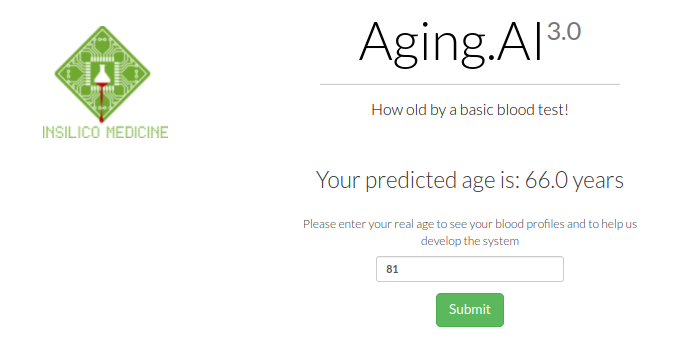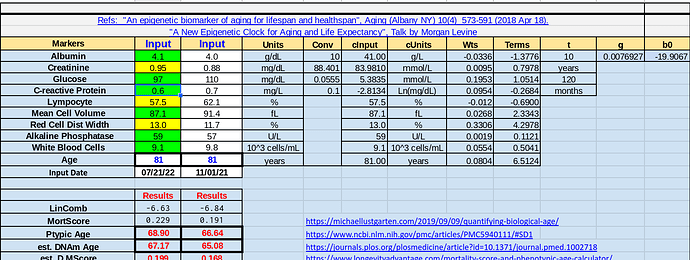Got it - that helps - but I don’t think I’ve ever said or implied it would be “2+2=4”, so I’m not sure where that came from unless you were responding to someone else.
Aging simply cannot be managed with one agent. It’s no surprise that not many researchers are betting it all on a single agent as the future, including Dr. Green (since you mentioned him) who has a personal cocktail and more extensive anti-aging regimen than mine while risking more serious drug interactions - yet he seems to be chugging along. His choice of antibiotics appears to be possibly dangerous for some people. Maybe he’s right about the combination and I’d be happy to change my mind on adding on even more - I simply can’t say with any guarantee - and it doesn’t feel like he’s particularly certain either. But it does seem he’s genuinely happy about his results so far.
We already know the effects of each agent mentioned - acarbose, metformin, and rapamycin share some pathways with IGF-1/insulin/inflammation-related cytokines - as well as mTOR - the key questions for me for managing combination drugs are:
-
Whether it would be no significant synergistic qualities and/or substantial negative effects.
-
Like any medicine, rapamycin has known side effects. How can we reduce it without reducing efficacy?
Rational combinations can reduce side effects. Using principles of rational drug combinations happens all the time in medicine to reduce side effects while increasing therapeutic efficacy.
Now if one were to apply your belief to bet only on one horse with only one life extension method with the highest level of evidence possible, the classic “life extension” pill commonly used in medicine right now is seen all the time in medicine:
statin, B-blocker, ACEi, aspirin, folic acid
Rapamycin isn’t even at the “weak recommendation” level btw. So it would make absolutely no sense to bet on rapamycin as the single best horse if we use that belief system.
If we didn’t touch combination drugs - the death rates for the elderly would be much higher. But nobody with the classic medicine approach believes in a “2+2=4” you’re talking about - widely known there are overlapping pathways. That can be managed.
The main disadvantage I see in all population-based “Cnidean School of Medicine” approaches out there (whether classic “life extension” pill in medicine or rapamycin only) is the neglect of “precision medicine” approaches and personalized regimens to adjust. That is a big downside to recommending a single monotherapy/combination drug regimen for everyone with that ultra-minimalistic strategy.
The most common example is thiazide/long-acting DHP-CCB for African-Americans instead of ACEi. It’s not quite “precision” enough - but easier to conceptualize.
It might turn out that your bet on rapamycin may reduce lifespan in your specific case. We have seen evidence of that before with calorie restriction.
In fact, Hippocrates first expressed both principles - “precision medicine” in “Coen School of Medicine” principles, on top of “food as medicine”. This is also the approach of the Okinawan centenarians when you look at the way they applied principles of personalized TCM combinations & “food as medicine”. Unfortunately, neither had simulation capabilities, molecular and genetic tests we can run today, nor do they have the vast range of real-time data options to analyze in detail. But they still did exceptionally well for what it’s worth. The main difficulty is in finding the right experts to check my homework, since there’s so much information to sift through and re-validate.
If you’re already set on sticking to one - that’s a personal decision based on your beliefs and I can respect that. It doesn’t necessarily mean it would be the “best” solution for every individual. If anything, there are many signs it wouldn’t be in terms of results, such that the consensus for researchers in the field taking rapamycin appears to be overwhelmingly towards combination approaches. And if dementia becomes no. 1 with cancer/CVD reduced with rapa/rapa combos - combination drug screening (Dr. MK included) for Alzheimer’s are already gaining traction due to the long track record of failures in monotherapy.
I simply have a different approach to medicine while balancing risks rooted in a hybrid belief system. Maybe it will turn out to be a bad decision, I can’t guarantee that it works for me (or anyone else) - it’s also not even a “weak recommendation”, but it seems to work in multiple animals and I’ve tried different cocktails on enough dogs in terms of empirical testing - enough for me to place my bets and carefully monitor therapy with my team.


